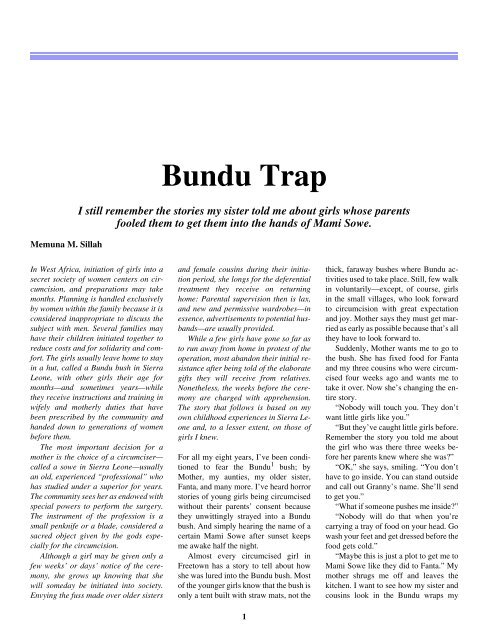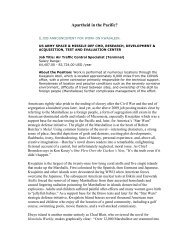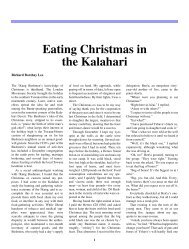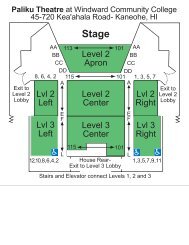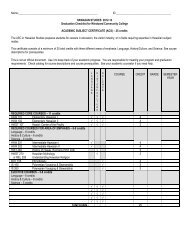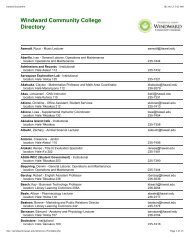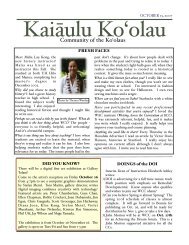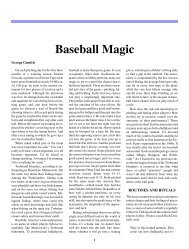Bundu Trap - Windward Community College
Bundu Trap - Windward Community College
Bundu Trap - Windward Community College
You also want an ePaper? Increase the reach of your titles
YUMPU automatically turns print PDFs into web optimized ePapers that Google loves.
Article 27<br />
Memuna M. Sillah<br />
<strong>Bundu</strong> <strong>Trap</strong><br />
I still remember the stories my sister told me about girls whose parents<br />
fooled them to get them into the hands of Mami Sowe.<br />
In West Africa, initiation of girls into a<br />
secret society of women centers on circumcision,<br />
and preparations may take<br />
months. Planning is handled exclusively<br />
by women within the family because it is<br />
considered inappropriate to discuss the<br />
subject with men. Several families may<br />
have their children initiated together to<br />
reduce costs and for solidarity and comfort.<br />
The girls usually leave home to stay<br />
in a hut, called a <strong>Bundu</strong> bush in Sierra<br />
Leone, with other girls their age for<br />
months—and sometimes years—while<br />
they receive instructions and training in<br />
wifely and motherly duties that have<br />
been prescribed by the community and<br />
handed down to generations of women<br />
before them.<br />
The most important decision for a<br />
mother is the choice of a circumciser—<br />
called a sowe in Sierra Leone—usually<br />
an old, experienced “professional” who<br />
has studied under a superior for years.<br />
The community sees her as endowed with<br />
special powers to perform the surgery.<br />
The instrument of the profession is a<br />
small penknife or a blade, considered a<br />
sacred object given by the gods especially<br />
for the circumcision.<br />
Although a girl may be given only a<br />
few weeks’ or days’ notice of the ceremony,<br />
she grows up knowing that she<br />
will someday be initiated into society.<br />
Envying the fuss made over older sisters<br />
and female cousins during their initiation<br />
period, she longs for the deferential<br />
treatment they receive on returning<br />
home: Parental supervision then is lax,<br />
and new and permissive wardrobes—in<br />
essence, advertisements to potential husbands—are<br />
usually provided.<br />
While a few girls have gone so far as<br />
to run away from home in protest of the<br />
operation, most abandon their initial resistance<br />
after being told of the elaborate<br />
gifts they will receive from relatives.<br />
Nonetheless, the weeks before the ceremony<br />
are charged with apprehension.<br />
The story that follows is based on my<br />
own childhood experiences in Sierra Leone<br />
and, to a lesser extent, on those of<br />
girls I knew.<br />
For all my eight years, I’ve been conditioned<br />
to fear the <strong>Bundu</strong> 1 bush; by<br />
Mother, my aunties, my older sister,<br />
Fanta, and many more. I’ve heard horror<br />
stories of young girls being circumcised<br />
without their parents’ consent because<br />
they unwittingly strayed into a <strong>Bundu</strong><br />
bush. And simply hearing the name of a<br />
certain Mami Sowe after sunset keeps<br />
me awake half the night.<br />
Almost every circumcised girl in<br />
Freetown has a story to tell about how<br />
she was lured into the <strong>Bundu</strong> bush. Most<br />
of the younger girls know that the bush is<br />
only a tent built with straw mats, not the<br />
1<br />
thick, faraway bushes where <strong>Bundu</strong> activities<br />
used to take place. Still, few walk<br />
in voluntarily—except, of course, girls<br />
in the small villages, who look forward<br />
to circumcision with great expectation<br />
and joy. Mother says they must get married<br />
as early as possible because that’s all<br />
they have to look forward to.<br />
Suddenly, Mother wants me to go to<br />
the bush. She has fixed food for Fanta<br />
and my three cousins who were circumcised<br />
four weeks ago and wants me to<br />
take it over. Now she’s changing the entire<br />
story.<br />
“Nobody will touch you. They don’t<br />
want little girls like you.”<br />
“But they’ve caught little girls before.<br />
Remember the story you told me about<br />
the girl who was there three weeks before<br />
her parents knew where she was?”<br />
“OK,” she says, smiling. “You don’t<br />
have to go inside. You can stand outside<br />
and call out Granny’s name. She’ll send<br />
to get you.”<br />
“What if someone pushes me inside?”<br />
“Nobody will do that when you’re<br />
carrying a tray of food on your head. Go<br />
wash your feet and get dressed before the<br />
food gets cold.”<br />
“Maybe this is just a plot to get me to<br />
Mami Sowe like they did to Fanta.” My<br />
mother shrugs me off and leaves the<br />
kitchen. I want to see how my sister and<br />
cousins look in the <strong>Bundu</strong> wraps my
mother bought them and in the necklaces<br />
of cloves and spices they’ll be wearing as<br />
jewelry. But I still remember the stories<br />
Fanta’s been telling me about girls<br />
whose parents fool them to get them into<br />
the hands of Mami Sowe. Like the one<br />
about one girl who was asked to deliver<br />
some expensive gold jewelry into her<br />
auntie’s hands. The girl waited at the appointed<br />
place for about thirty minutes<br />
before her auntie appeared with two<br />
other women. Fanta said that had this girl<br />
frequented <strong>Bundu</strong> bushes before, she<br />
would have recognized the women as<br />
Mami Sowe’s assistants. Minutes later<br />
one of the women forced a large piece of<br />
cloth into the girl’s mouth. By the time<br />
the girl was able to breathe through her<br />
mouth again, she was bleeding profusely.<br />
Fanta never told me where the<br />
bleeding came from, although my<br />
brother Amadu said they broke the girl’s<br />
teeth when they forced the cloth into her<br />
mouth.<br />
My mother returns to the kitchen,<br />
holding a tray and kitchen towel. She<br />
busies herself packing two large bowls<br />
into the tray. I help her wipe excess oil<br />
off the covers and try some last-ditch delaying<br />
tactics.<br />
“I don’t know where the bush is or<br />
how to get there,” I say.<br />
My mother smiles softly. “They’re<br />
expecting you. Now, change your<br />
clothes before the food gets cold.”<br />
“Why shouldn’t Amadu take the<br />
food? He’s the older one.”<br />
“Go get dressed before I get angry.”<br />
She is shouting now as she goes down<br />
the kitchen steps. I follow her into the<br />
house. She pushes me into her bedroom<br />
and points to a dress lying on the bed.<br />
“Put that on before you come out.” She<br />
gives the orders as she pulls a red-andwhite<br />
checkered towel from the basket<br />
on the floor. I am getting nervous, but I<br />
don’t want her to notice. I figure if it is<br />
decided I should be circumcised this<br />
summer, Mother will figure out a way to<br />
get me out of the house, will or woe. But<br />
I am not going to make it easy for her.<br />
I feign a struggle, pulling the dress<br />
down over my face. She ignores me. I try<br />
conversation.<br />
“How have they been, Fanta and<br />
Mbalia and Yanati and Seray? How have<br />
they been since they’ve been at the<br />
bush?”<br />
“They look very nice in the cotton<br />
material I bought them, and they’ve all<br />
put on weight.”<br />
“What do they eat there?” I ask with<br />
great interest.<br />
“Every kind of food you can think of.<br />
Last Friday, Mbalia asked for sattie, 2<br />
and Auntie Mbalia prepared it for them<br />
in the morning. Then Auntie Seray prepared<br />
couscous and salads for Yanati in<br />
the afternoon, and Auntie Fanta roasted a<br />
whole duck for dinner. It’s been like that<br />
every day.”<br />
This is my favorite part of the entire<br />
<strong>Bundu</strong> process—the eating and drinking<br />
to the heart’s content. The thought actually<br />
calms me down a little as I begin to<br />
imagine cassava leaves, potato leaves,<br />
obiata, 3 jollof rice, 4 plantains, okra, and<br />
foofo, 5 all lined up in front of my dietconscious<br />
sister and cousins.<br />
“What did you cook?” I ask, following<br />
my mother back to the kitchen.<br />
She replies, “Yanati said she wanted<br />
to eat some fried fish with plantains before<br />
the ceremony tonight. So that’s…”<br />
“What ceremony?” I ask jumpily, wondering<br />
if it has anything to do with me.<br />
“We’re going to do a small ceremony<br />
tonight, so the girls will be able to come<br />
outside and walk around the yard. Maybe<br />
in a few weeks they can go out into the<br />
streets.”<br />
“I’ll just leave the tray at Granny’s<br />
house, and somebody else will take it to<br />
the bush.”<br />
As the women work, they<br />
sing, moving their heads<br />
or waving the knives in<br />
their hands to the rhythm<br />
of the song.<br />
“You have nothing to worry about.<br />
Granny is there. She won’t let them<br />
touch you,” Mother says as she spreads<br />
the towel over the food and places the<br />
tray on my head.<br />
I grab the sides of the heavy tray with<br />
both hands and bite my lower lip as I<br />
make my way out toward the gate.<br />
2<br />
Article 27. <strong>Bundu</strong> <strong>Trap</strong><br />
“Keep both hands on the tray,”<br />
Mother shouts as I leave the confines of<br />
her gate.<br />
Before I reach the empty lot next to<br />
Granny’s house, I hear the sound of<br />
women singing and clapping. The<br />
women sit in clusters of five to seven—<br />
one group is peeling onions, another is<br />
skinning fowls, another pounding flour<br />
in large mortars, another cutting meat.<br />
As the women work, they sing, moving<br />
their heads or waving the knives in their<br />
hands to the rhythm of the song. I try to<br />
weave my way through the enormous<br />
pots and bowls, the white powder from<br />
the mortars, the obese legs sprawled between<br />
one bowl and another. Auntie Ole,<br />
Haja 6 Khadi, Auntie Memuna, Haja Fatmata,<br />
Miss Conteh, Haja Alari. I call out<br />
those names I remember and smile<br />
broadly to the others.<br />
It doesn’t seem as bad as I had imagined.<br />
I feel as though I could leave the<br />
food with one of these aunties or hajas<br />
and return home safely, but I move on,<br />
even quickening my now light steps until<br />
suddenly I see it. Spiked stalks of dried<br />
bamboo leaves protrude from the roof of<br />
a dark hut standing ahead of me on the<br />
farthest end of the yard. Its fragile walls<br />
of straw mats are square in shape, and<br />
from where I am standing, I can see no<br />
doors. Just as I begin to imagine being<br />
locked up inside with Mami Sowe, with<br />
no way of escape, I see a woman sitting<br />
by what finally is beginning to look like<br />
a doorway to the bush. She is cutting<br />
cloth—the same cloth my mother said<br />
she bought for Fanta and the others. I remember<br />
mother saying they looked good<br />
in it, so why is it only being cut now? I<br />
don’t have time to answer my own question.<br />
The woman’s voice cuts its way<br />
through my thoughts like a butcher’s<br />
knife on brisket.<br />
“Send her over here.”<br />
My blood stops cold, my legs weaken<br />
under me, and my head begins to spin.<br />
Voices murmur around me. Ear-piercing<br />
clanks cause my head to feel as though<br />
every piece of flesh is suddenly scalpeled<br />
from the inside. A wet piece of<br />
cloth passes through my mouth. I feel the<br />
soaked sponge of red fluid on my face<br />
and neck—and then a soft voice.<br />
“Your mother is not going to be<br />
pleased.”
ANNUAL EDITIONS<br />
Other voices intervene. “You were not<br />
paying attention. What happened to you?”<br />
“Leave her alone, she was just afraid,<br />
coming to a <strong>Bundu</strong> bush.”<br />
“You mean she is still not…?”<br />
“Oh yes, don’t you know her? She’s<br />
Siminie, Mariatu’s daughter.”<br />
Inside the <strong>Bundu</strong> bush is<br />
the smell of burned,<br />
perfumed palm oil and the<br />
sound of the women’s<br />
Mandingo songs.<br />
“Take her in to Granny Yamakoro.<br />
She’s inside.”<br />
“Wait, let her rest a little out here<br />
first.”<br />
“No, let her go inside and rest.”<br />
“Let her take the empty bowls with<br />
her.”<br />
“No, let her go for now.”<br />
“Where’s the food?” I gasp when I<br />
manage to remove the palm-oil-soaked<br />
towel from my face. Just as I am asking<br />
the question, I see Mother’s bowls, bottoms<br />
up on the floor, mud-red pieces of<br />
fish and plantain on the ground.<br />
The voices continue: “Let her go<br />
wash her face.”<br />
“Someone give her some soap.”<br />
“No, just water will do.”<br />
The setting inside the <strong>Bundu</strong> bush is<br />
similar to the one outside, except for the<br />
strong smell of burned, perfumed palm<br />
oil and the vivacious claps accompanying<br />
the Mandingo 7 songs. About a dozen<br />
more aunties sit on the mud floor, which<br />
is covered with straw mats similar to<br />
those used to panel the windowless bush.<br />
Granny is sitting on her special wide<br />
bench, the only seat that can contain all<br />
of her behind. As soon as she sees me,<br />
she motions for me to enter. Still mute<br />
from the food accident, I enter like one<br />
drugged. Granny places my skinny body<br />
between her thick legs. The warmth relaxes<br />
me a little, and my eyes begin to<br />
search for Fanta and my cousins.<br />
They’re all sitting on the floor, with<br />
straightened backs and stretched-out<br />
legs, like Barbie dolls. The tallest of the<br />
four, Fanta, sits at the far end of the<br />
room. Mbalia is sitting next to her, then<br />
Seray; Yanati, the shortest, is at the other<br />
extreme end. They’re all topless to their<br />
waists, which are wrapped in the blackand-blue<br />
cotton cloth Mother had<br />
bought. Their heads are tied with the<br />
same cloth. Between the head-tie and the<br />
waist wrap, their bare breasts—full and<br />
firm, garnished with palm oil and dried,<br />
beaded cloves—jump up and down as<br />
the girls clap their hands. The girls’<br />
breasts carry the same vigorous rhythm<br />
of the dancing heads of the women sitting<br />
opposite them. While the aunties<br />
seem to be enjoying the songs, the girls<br />
look as though they would be happy to<br />
leave any time.<br />
I notice my cousins have all put on<br />
weight. Fanta’s face looks sour, the way<br />
it does when she’s eating tamarinds. I’m<br />
dying to ask her why, in all her seventeen<br />
years, she did not suspect anything when<br />
Auntie Iye came to take her shopping.<br />
But I dare not leave the security of<br />
Granny’s legs.<br />
Standing in front of the <strong>Bundu</strong> girls is<br />
a short, fleshy woman with extremely<br />
tiny eyes and sharp, almost loony eyeblinks,<br />
leading the song with a long, thin<br />
stick that she waves over their heads. She<br />
is dressed in ordinary, even dirty-looking,<br />
clothes, but something about her<br />
holds me hostage. Maybe it is her baritone<br />
voice, which supports the song<br />
when the other women forget a line, or<br />
the looks she throws out when the girls<br />
mispronounce an old Mandingo word.<br />
Or, maybe it is her grandly gesticulating<br />
manner and the flabby piece of extra<br />
flesh waving under her arm, or the way<br />
she uses the stick to control the song and<br />
at the same time separate Fanta’s tightly<br />
set legs or straighten Yanati’s slouch. As<br />
soon as the song ends, the woman with<br />
the stick starts another, pausing slightly<br />
to look over to where Granny is sitting.<br />
When Granny smiles and nods her head,<br />
the woman continues with added confidence,<br />
then gives the silent girls on the<br />
mat a strong look. Seray slouches and<br />
lowers her head on her chest. The<br />
woman gives her three quick taps on the<br />
shoulder, and her back straightens again.<br />
Fanta frowns, and Auntie Mbalia admonishes<br />
her with a tight wink. Yanati<br />
and Mbalia mouth the words, anxiety<br />
crowding their faces. Sensing the impending<br />
judgment, the mothers and aun-<br />
3<br />
ties quickly double their enthusiasm and,<br />
adding to Granny’s frail voice, carry off<br />
the song. The girls begin to clap again,<br />
their breasts following energetically. I<br />
can actually feel the relief I see on their<br />
faces. Yanata and Mbalia smile at each<br />
other.<br />
I find myself thinking that I will get<br />
Granny to teach me all the <strong>Bundu</strong> songs<br />
before my time comes, because I<br />
wouldn’t want to offend this peculiar<br />
woman. I’m thinking I’ll ask Fanta to<br />
teach me all she has learned when she returns<br />
home. That way.… “Come this<br />
way with me, Siminie.”<br />
A large hand grabs mine, axing my<br />
thoughts at the same time. I turn around<br />
to see the face of one of three women in<br />
the bush I do not recognize. Something<br />
about her face cuts a vein in my heart. I<br />
try to climb onto Granny’s chest, clutching<br />
at her.<br />
“Don’t let her take me away,<br />
Granny.”<br />
Granny peels my fingers off her<br />
clothes.<br />
“You’re going to choke me.”<br />
My aunties and cousins, meanwhile,<br />
are rolling over one another with laughter.<br />
Only Fanta looks worried. The<br />
woman with the stick allows a smile to<br />
escape.<br />
“What are you afraid of?” she asks<br />
aggressively, feigning a confrontation.<br />
“She’s lucky we’ve waited this long.<br />
At her age, I had already forgotten what<br />
<strong>Bundu</strong> was like,” Auntie Mbalia says.<br />
“Don’t listen to them,” Granny says,<br />
putting her arms around me. “I am your<br />
father’s mother. While I’m alive, I’m the<br />
only person who can give consent for<br />
you to be brought into this <strong>Bundu</strong> society.”<br />
“Oh, but I’m your father’s sister. I can<br />
do it too,” Auntie Mbalia insists.<br />
“No, you cannot. Granny is older than<br />
you. She won’t let you,” I scream from<br />
the safety of Granny’s lap. Everybody<br />
laughs again.<br />
I notice that the girls on the mat are<br />
beginning to lose their straight backs and<br />
Barbie legs. Fanta is resting on the palms<br />
of both hands behind her back, Yanati is<br />
slouching, Seray has one hand on<br />
Yanati’s shoulder; only Mbalia maintains<br />
a straight back. Even the woman
with the thin rod now seems more interested<br />
in me than in her pupils.<br />
“The little girl understands things<br />
well,” she says, nodding to Auntie Mbalia.<br />
“Oh, but if her granny is not around, I<br />
will be the one in charge. I hope she<br />
knows that.”<br />
Granny puts her arms<br />
around me. I know that I<br />
have been saved so far<br />
only because she, like<br />
my mother, believes<br />
in education.<br />
Then turning to me, Auntie Mbalia<br />
adds, “Just pray for your granny to be<br />
alive until you finish school.”<br />
Even though Auntie Mbalia loves to<br />
tease me, I know she is serious about<br />
having me circumcised as soon as possible.<br />
Her own three daughters were all<br />
circumcised only a few days after birth.<br />
Auntie Mbalia believes in doing things<br />
“the way our people did.” I know I have<br />
been saved so far only because Granny,<br />
like my mother, believes in education.<br />
Granny single-handedly put her two sons<br />
through school after her husband died,<br />
when my father, the elder, was only six<br />
years old. She has not regretted the sacrifice;<br />
her children provide adequately for<br />
her today.<br />
“I’m not dying yet. I won’t die until<br />
I’ve seen all my granddaughters circumcised,”<br />
Granny says defensively.<br />
“Amin, 8 Amin, Amin,” the women<br />
chorus, including Auntie Mbalia. The<br />
woman with the stick sets herself down<br />
on the floor.<br />
“That’s the dream of every grandmother.<br />
Allah will answer your prayers.”<br />
She is almost whispering now, her face<br />
changing into the same serious mold it<br />
had when she scrutinized her pupils. She<br />
settles the rod on the ground beside her,<br />
pulls her clothes together and tucks them<br />
between her legs. “That was my grandmother’s<br />
biggest dream,” she begins.<br />
“She was a sowe herself in my village,<br />
and she taught me everything I know today.<br />
I used to go with her to the bushes to<br />
pick the leaves she used. We would wake<br />
up early in the morning, before even the<br />
fowls began to crow, to set off for the<br />
bushes. Even though I was only about six<br />
or seven years old, she only had to say<br />
my name once, and I was jumping out of<br />
the mat. I used to sleep on the ground beside<br />
her. There would be nobody on the<br />
paths from the moment we left the hut<br />
until we returned from the depth of the<br />
bushes. My grandmother liked it that<br />
way—she tried to avoid bad spirits who<br />
might spoil the power of the leaves. She<br />
knew the strength of every leaf in the<br />
bush, the old woman. All her life as a<br />
sowe, almost forty years, she never once<br />
lost a child in operation. Not a single<br />
one.”<br />
The women punctuate the story with<br />
impressive Alhamdudilais. 9<br />
“And remember, with us Temne 10<br />
people, we put our children through society<br />
at a very early age, sometimes as<br />
young as five years, for both girls and<br />
boys. You know the sooner we were prepared<br />
for marriage, the better it was for<br />
our parents.…”<br />
“But in Freetown, most Temne girls<br />
who go to school don’t go through society<br />
until after they finish school,” Fanta<br />
argues. I had almost forgotten what<br />
Fanta’s voice sounded like. It is the first<br />
time I’ve heard any of the girls speak<br />
since I entered the bush.<br />
I don’t know how the thin stick got<br />
from the floor to the air. I just see it there,<br />
flying about.<br />
“Did I ask any of my girls a question?”<br />
The woman with the stick is talking<br />
to the bamboo ceiling. She turns to<br />
the other women and asks, “People, did I<br />
give Fanta permission to talk? Is Fanta<br />
allowed to talk when society women are<br />
talking? Fanta who is still not healed,<br />
Fanta who still has more than half the trials<br />
of society to pass through—can she<br />
talk when the rest of us are talking?<br />
Women, please tell me.”<br />
I notice Auntie Fanta vehemently<br />
loosening a small knot at the edge of her<br />
clothes. Hiding behind her namesake,<br />
she unfolds a small stack of bills and retrieves<br />
two notes, which she folds up into<br />
an even smaller stack. She ties her wrap<br />
again and stands up.<br />
“Mami Sowe, you did not throw any<br />
words at Fanta, and Fanta should not<br />
have the mind to talk before she’s asked<br />
4<br />
Article 27. <strong>Bundu</strong> <strong>Trap</strong><br />
to do so. But she’s only been here three<br />
weeks. Let us please forgive her. In time,<br />
she’ll learn the ways of a woman. That’s<br />
the reason.…” I do not hear the rest of<br />
Auntie Fanta’s words. The name Mami<br />
Sowe has just taken effect on me.<br />
“Is she Mami Sowe?” I ask in<br />
Granny’s ears.<br />
Granny does not answer.<br />
Auntie Fanta tries to press the folded<br />
notes into the woman’s hand.<br />
“Let this pay the fine.”<br />
“But did I ask for a fine yet? You Fantas<br />
are all alike. You think I’m cheap?<br />
Don’t you know that if there’s a fine, I<br />
should tell you what the fine should be?<br />
This is the problem with <strong>Bundu</strong> in towns.<br />
There is no respect for the sowe. Get<br />
away from me.” She pushes Auntie<br />
Fanta with her elbow.<br />
The women are laughing, and I suddenly<br />
find them all very strange. I am actually<br />
standing in Mami Sowe’s<br />
presence, and I did not know it, just as<br />
Fanta did not suspect the shopping expedition<br />
with Auntie Iye would end up in<br />
the <strong>Bundu</strong> bush. Me, finally in the hands<br />
of Mami Sowe. Even as the women<br />
laugh, they’re nodding their heads in<br />
agreement with Mami Sowe. They all<br />
agree with everything she says.<br />
Auntie Fanta stands up and playfully<br />
pulls at the extra flesh under Mami<br />
Sowe’s armpit.<br />
“What do you expect? We’re in Freetown;<br />
this is British <strong>Bundu</strong>.”<br />
Mami Sowe points a hand at Auntie<br />
Fanta. “Then maybe you should have<br />
taken your children to the British so they<br />
can circumcise them.”<br />
“Oh, they can do that in hospitals<br />
nowadays, you know, and you don’t<br />
even have to go through all the expenses.<br />
You do it quietly there, everything is<br />
faster, and you bring them home<br />
sooner.”<br />
This is the first time I’m hearing this.<br />
There’s <strong>Bundu</strong> in the hospitals too? First<br />
there was injection, now there’s circumcision.<br />
I must remember that next time<br />
mother asks me to accompany her to visit<br />
some relative at the hospital. But I’m not<br />
the only person who is shocked.<br />
Mami Sowe’s mouth is agape. She recovers<br />
soon enough and takes on Auntie<br />
Fanta.
ANNUAL EDITIONS<br />
“Can the hospitals perform the different<br />
ceremonies? Can they teach your<br />
daughters to fetch water from a well, to<br />
cook, to know when to talk, to know how<br />
to address elders? Can the hospitals prepare<br />
them for marriage? Can the hospitals<br />
find them husbands? Only a fool like<br />
you will put your daughters through all<br />
that pain without teaching them anything.<br />
Just move out of my way.”<br />
Everybody laughs again. One of the<br />
laughs from the mat is so loud that it startles<br />
Mami Sowe. She turns around and<br />
addresses the girls in a commanding<br />
tone. “Who laughed like that?” The girls<br />
on the mat look at one another and maintain<br />
a cold silence. “I want to know the<br />
person who laughed so loud just now. I<br />
want her to sell me some raw fish.” 11<br />
The silence is beginning to freeze.<br />
“If you all think you will leave my<br />
bush without good manners, then my<br />
name is not Mami Sowe.”<br />
Mami Sowe’s countenance has taken<br />
an even sterner look than the one it had<br />
when I first walked into the bush. She<br />
now looks like what I’d always imagined<br />
her to be—a heartless, merciless inflicter<br />
of pain on little girls. She pans the faces<br />
of her pupils from one end of the room to<br />
another. Auntie Mbalia cuts through the<br />
silence.<br />
“You have to learn to adjust your behavior<br />
in this bush. Whatever loose ways<br />
you have acquired during your lifetime,<br />
this is the place where you offload them<br />
and leave them on these mats.”<br />
Auntie Seray adjusts her head-tie to<br />
deliver her portion of the speech: “You<br />
must listen to instructions and learn to<br />
comport yourselves well in this bush.<br />
This is the beginning of your adult life,<br />
your life as a woman, a respectable<br />
woman in society. The skills you learn<br />
here will be with you for the rest of your<br />
lives. If you cannot own up to your responsibilities<br />
here, where else will you<br />
be able to do that?”<br />
Mami Sowe is now looking so<br />
pleased, I almost think the speeches were<br />
meant to please her and were not for the<br />
girls.<br />
Auntie Seray moves closely to her<br />
namesake and, rubbing her legs, whispers<br />
a few words into her ear.<br />
Seray adjusts herself on the mat.<br />
“OK, I was the one who laughed,” she<br />
says. Then, as if angered by her own confession,<br />
she tosses her chin up and adds,<br />
“What’s wrong with laughing, anyway?”<br />
Seray barely finishes her sentence before<br />
her mother in some magical way<br />
gets the stick from Granny’s hands and<br />
starts hitting Seray incessantly on the<br />
head.<br />
“What’s wrong with this child? She<br />
should have been circumcised long before<br />
this.”<br />
I wriggle my small body between<br />
Granny’s legs to hide my presence, lest<br />
they decide to have me circumcised before<br />
I become like Seray.<br />
I know one day I will be<br />
circumcised. But I also<br />
know that when the time<br />
comes, I will not surrender<br />
without a fight.<br />
Granny is crying and swaying her behind<br />
from side to side, unable to get up<br />
from her bench, and wanting everyone to<br />
see her distress. “All these witches walking<br />
around this bush ever since these<br />
children were brought here, trying to destroy<br />
my grandchildren, trying to distract<br />
them from the lessons they should be<br />
learning.” Then wiping her tears, she<br />
says decisively, “Tomorrow, first thing<br />
in the morning, I am sending for Pa<br />
Morlia 12 to drive out the bad spirits. I<br />
will put an end to this, or my name is not<br />
Yamakoro.”<br />
The attention of everyone now turns<br />
to calming down Granny. They remind<br />
her of her high blood pressure, ask her to<br />
look to God, assure her that Seray will<br />
change, show her examples of wild girls<br />
who changed and ended up getting good<br />
husbands. Mami Sowe is rubbing<br />
Granny’s back; a soft look now blankets<br />
her face.<br />
The conciliatory mood in the room is<br />
interrupted by the entrance of one of the<br />
women who were cutting meat outside.<br />
She walks over and kneels down beside<br />
Mami Sowe, then whispers something in<br />
her ear. Mami Sowe in turn whispers into<br />
Granny’s ear, and Granny straightens up,<br />
then makes a hand movement I do not<br />
5<br />
understand to Auntie Mbalia. The latter<br />
looks at me, then at Auntie Fanta, then<br />
back at me.<br />
“Granny, can I go to the bathroom?” I<br />
ask quietly.<br />
“Not yet,” she answers, then points to<br />
the meat-cutting woman. “Go with Auntie<br />
Zainab. She will take you home,” she<br />
says, and she continues whispering with<br />
Mami Sowe.<br />
Confused, I try to remember how I arrived<br />
here. I had told mother I didn’t<br />
know how to get to the <strong>Bundu</strong> bush, but<br />
that was only an excuse not to come. In<br />
fact, I had located the bush the very first<br />
week my sister and cousins started their<br />
confinement here, and I’d increased considerably<br />
my reasons for passing by<br />
Granny’s house during every errand I<br />
ran. While I usually give all <strong>Bundu</strong><br />
bushes a wide berth, it has been difficult<br />
to distance myself from this one holding<br />
Fanta and my cousins within. Sometimes,<br />
while standing in front of it, I was<br />
petrified and mesmerized at the same<br />
time. All the women in my family are<br />
<strong>Bundu</strong> women. I know that one day, with<br />
or without my consent, I will be circumcised.<br />
But I also know that when the time<br />
comes, I will not give in without a fight.<br />
My mother is sitting on the kitchen<br />
steps, her face in her hands. As soon as<br />
she sees me, she stands up.<br />
“If you didn’t want to take the food<br />
for me, you should have said so.”<br />
I do not believe my mother is talking<br />
like that. I cannot contest her now so I<br />
just let her talk while I catch my breath.<br />
“All that food I spent the whole day<br />
preparing; for you to go and throw it all<br />
away like that, in the blink of an eye.”<br />
“I was afraid,” I manage to add<br />
through breaths. “I thought.…”<br />
“I don’t want to know what you<br />
thought. I warned you to keep your<br />
hands on the tray. I don’t know why you<br />
think you can keep a tray on your head<br />
without your hands on it.”<br />
“I was holding it. I held it all the way<br />
to Granny’s house.”<br />
“And what were you standing in the<br />
bush for? What business did you have<br />
there when they wanted to start the ceremonies?”<br />
“Granny wanted a strange woman to<br />
take me away,” I reply.
Asha Samad<br />
Worldwide, some 80 to 100 million women<br />
have undergone an operation first recorded in<br />
Egypt more than 4,000 years ago. Since then,<br />
“female circumcision” in various forms has<br />
been customary in many African and in some<br />
Asian, Middle Eastern, and indigenous Central<br />
and South American cultures. Very different<br />
from male circumcision (the removal<br />
of the foreskin of the penis), female circumcision<br />
can involve the partial or total removal of<br />
the clitoris and/or “infibulation,” surgical<br />
modification and suturing together of the labia.<br />
In some areas (Chad, Somalia, Sudan),<br />
“decircumcisions” are necessary to open infibulations<br />
before marriage and childbirth.<br />
While many associate female circumcision<br />
with Muslim tradition, it predates Judaism,<br />
Christianity, and Islam. It has also been practiced<br />
by Jewish communities and Christians<br />
living in regions where circumcision is customary.<br />
Condemned by African women’s groups<br />
and the World Health Organization as abusive<br />
and often dangerous, female circumcision<br />
persists even where modern African<br />
governments seek to limit or prohibit it.<br />
While most women survive these mutilating<br />
operations, they may suffer immediate and<br />
lasting physical effects. Hemorrhaging, infection,<br />
and infertility are among the serious<br />
complications. The inability to pass urine normally,<br />
pain during sexual intercourse, and excessively<br />
difficult deliveries are common<br />
results. Although harder to measure, emotional<br />
and psychological effects may also ensue.<br />
“You were standing there like a dead<br />
body. She was going to bring you home.”<br />
“I know my way home,” I answer defensively.<br />
“You know your way home, and you<br />
couldn’t keep a tray of food on your<br />
head.”<br />
“I told you I was afraid they were going<br />
to catch me.”<br />
The way Mother is looking at me, I<br />
know that if a garbage truck for children<br />
came along at this moment, she would<br />
happily throw me in.<br />
“They should have just circumcised<br />
you then so you could stay there. Maybe<br />
they’ll find you a husband after that.<br />
You’re no use to me.”<br />
I know my mother is just upset, so I<br />
don’t say anything. I go inside the house<br />
Afterword<br />
All groups circumcising females also circumcise<br />
males. Such groups regard the rite as<br />
an essential part of a child’s socialization.<br />
The operation is done at different ages in different<br />
societies—ranging from a few days after<br />
birth until puberty. However, among some<br />
ethnic groups it is done just prior to marriage,<br />
or, as in Rivers state, Nigeria, in the seventh<br />
month of the woman’s first pregnancy. The<br />
rite can symbolize the stability of the group as<br />
expressed in the faithfulness of its females—<br />
the passers-on of its customs and the maintainers<br />
of its families. The custom also reinforces<br />
respect and authority. The day of<br />
circumcision thus involves not only pain but<br />
also recognition for having become a full<br />
adult and a marriageable member of society.<br />
Other obvious functions of female circumcision<br />
include control of female sexuality and<br />
marital chastity. In patrilineal societies, authority<br />
over the bride is transferred at marriage<br />
to the spouse’s patriline. The bride’s<br />
moral and economic value to her patriline and<br />
to her spouse is dependent upon her unquestioned<br />
virginity as demonstrated by the intact<br />
infibulation.<br />
Many groups feel that attempts to prevent<br />
them from practicing circumcision represent<br />
an attack on their cultural integrity by “colonial,”<br />
Western interests and westernized African<br />
governments. (The Masai, for instance,<br />
are loath to change customs at the behest of a<br />
government that has moved them out of their<br />
traditional lands.) They may fear that loss of<br />
a cohesive tradition, with nothing to replace<br />
it, will result in daughters who are as “loose”<br />
and change my clothes, happy I came<br />
back—at least for now.<br />
NOTES<br />
1. Circumcision; secret society of circumcised<br />
women.<br />
2. Rice porridge.<br />
3. Sisal leaves cooked in West African<br />
sauce.<br />
4. Senegal-style red rice.<br />
5. Cooked cassava dough.<br />
6. Title of honor for a woman who has<br />
been on a pilgrimage to Mecca.<br />
7. A minority tribe of Sierra Leone.<br />
8. “Amen.”<br />
9. “Thanks be to God.”<br />
10. A majority tribe in Sierra Leone.<br />
11. “She sounds like a fishwife.”<br />
12. A shaman who will cast out “bad<br />
spirits.”<br />
Reprinted with permission from Natural History, August 1996, pp. 42–52. © 1996 by Memuna M. Sillah.<br />
6<br />
Article 27. <strong>Bundu</strong> <strong>Trap</strong><br />
as uncircumcised African and Western<br />
women are perceived to be. More generally,<br />
they believe that an uncircumcised daughter<br />
may become centered on herself, rather than<br />
family, home, and group.<br />
Some westernized Africans now debate<br />
the value of female circumcision. But fear<br />
that uncircumcised daughters will not be acceptable<br />
as brides in their communities<br />
spurs many to perpetuate the custom. Some<br />
parents may seek modified forms of the operation<br />
for their daughters and may have the<br />
procedure performed in private clinics or at<br />
home under anesthesia and in antiseptic<br />
conditions.<br />
Some—usually Western-educated African<br />
women, often of independent means, or<br />
those living in the immigrant and refugee<br />
communities of Europe and North America—<br />
have fully rejected the procedure and are educating<br />
women about its deleterious effects<br />
and organizing to end the custom. At the same<br />
time, other women protest what they consider<br />
outside interference in the most intimate aspects<br />
of their culture. They ask why Western<br />
women—whose own culture often leads them<br />
to radically alter their appearance, even<br />
through surgery—are so intolerant of the<br />
practices of others.<br />
What African women on both sides of the<br />
issue resent most is being looked upon by the<br />
rest of the world as self-mutilating primitives.<br />
Even opponents of circumcision feel that<br />
women from the ethnic groups practicing this<br />
ancient custom should be the ones leading the<br />
fight to eradicate it.<br />
Born in Sierra Leone, Memuna M. Sillah<br />
grew up “in the midst of quiet, yet constant,<br />
revolts, especially by teenage girls, against<br />
the unnecessary pain caused by genital mutilation.”<br />
Sillah came to the United States eight<br />
years ago, after living in London, Paris, and<br />
Kingston, Jamaica. Now a graduate student<br />
in sociology at City <strong>College</strong> of the City University<br />
of New York (CUNY), she has been<br />
actively concerned with the problem of female<br />
genital mutilation since 1993, when she<br />
chose the topic for a term paper in Asha Samad’s<br />
course on violations of women’s<br />
rights. “I then learned,” Sillah writes, “how<br />
widespread the practice is in Africa and other<br />
parts of the world—and the drastic forms it<br />
can take. This knowledge awakened my old<br />
teenage passions against the practice.” Sillah<br />
is now at work on a novel about immigrant<br />
African women in the United States.


